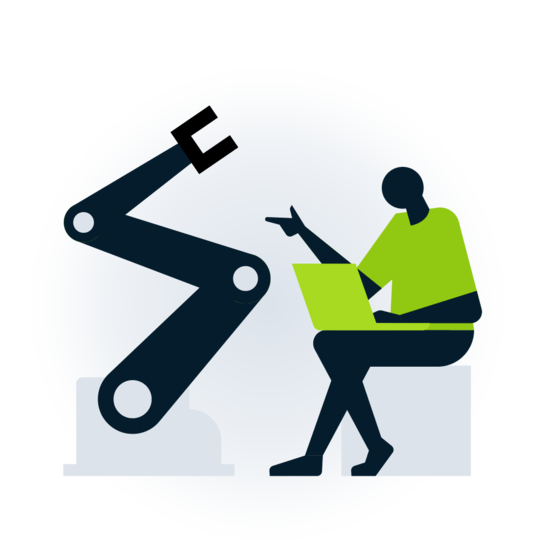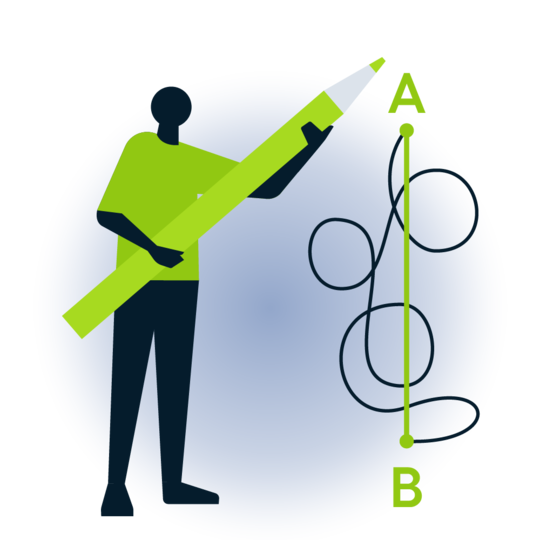Make your warehouse less error-prone and more effective
Nimble can help your planning employees work more effectively, so they have a better overview and work less error-prone.
-
Reducing staff shortages and get an optimal planning based on Artificial Intelligence
Reducing staff shortages and get an optimal planning based on Artificial Intelligence
Optimal planning is an important part of any business process. Whether it's production, logistics, project management or staff management. A good planning can help improve efficiency, reduce costs and increase productivity. Traditionally, planning is carried out by human planners, but with the rise of Artificial Intelligence, it has become possible to automate and optimize these processes. This makes it possible to reduce a staff shortage.
Predictive analytics
Artificial Intelligence can be used to perform predictive analytics based on historical schedules to predict future trends and behaviors. Based on this information, companies can adjust their staffing, production and inventory management.
Automate routine tasks
Artificial Intelligence can also be used to automate routine tasks. This can be, for example, scheduling meetings or drawing up schedules. By automating these tasks, employees have more time to focus on the more important tasks where they can add more value.
Artificial Intelligence is the future
Artificial Intelligence offers the ability to automate and optimize planning, enabling companies to make their processes more efficient and make better use of their resources. The use of AI in planning is expected to continue to increase in the future as technology continues to evolve and companies increasingly recognize its benefits.
-
Faster planning through the use of software robots
Faster planning through the use of software robots
The more employees and teams there are, the more complex it becomes to properly connect all schedules within an organization. However, Robotic Process Automation (RPA) can help simplify and optimize this process through the use of (digital) robots.
Manual or automated scheduling?
While manual scheduling is still the norm for many companies, it certainly has its drawbacks. For example, with manual scheduling you are dependent on the accuracy and speed of the employees. Human error cannot be prevented, but unfortunately this can lead to inaccurate schedules, which than can lead to operational inefficiencies or unnecessary additional costs.
Through RPA robots, repetitive tasks, such as entering data, can be eliminated. A robot can also collect and integrate information from different sources. This ensures that employees get the right information out of the systems in a shorter period of time.
Real-time adjustments
Another advantage of RPA is that it offers the possibility to make real-time adjustments to schedules. Suppose there are unexpected changes in capacity or demand for products, a robot can immediately adjust the planning to match the new circumstances. As a result, both inventory and capacity remain efficiently managed.
-
Accurate planning through Robotic Process Automation
Accurate planning through Robotic Process Automation
In the modern world, accurate planning is crucial to an organization's success. Planning is a complex process that requires involvement from various departments within a company, such as purchasing, production, logistics and finance. Due to the growing complexity of processes within an organization and the increase in the number of tasks that need to be performed, it is becoming increasingly difficult for an organization to carry out accurate planning and manage the business process. Robotic Process Automation (RPA) is an excellent solution for this.
Automate time-consuming scheduling
RPA uses software bots to automate repetitive and time-consuming processes as much as possible. These bots can take over human actions and work in the same way as real employees. One of the key benefits of RPA is that it can help organizations manage inventory more effectively. Accurate inventory planning is important for organizations to be able to deliver to the customer on time and provide alerts if inventory runs out. In addition, it is also crucial to prevent companies from ending up with a surplus of stock.
Automate production planning
Another advantage of RPA is that it can help companies with the planning of production. By automating production processes, companies can reduce production time and increase efficiency. This allows companies to bring their products to market faster, leading to a competitive advantage.
Manage finances with RPA
Robotic Process Automation can also help manage finances. Financial planning is a complex process that requires involvement from different departments. RPA allows companies to automate financial processes such as invoicing, payment processing and accounting. This improves the financial health of a company and ensures accurate reporting.
Higher customer satisfaction by using RPA
Finally, RPA helps to increase customer satisfaction. Customer satisfaction is achieved because employees have more time to give customers the attention they deserve. With RPA and proper employee training, a company is helped to maintain a competitive advantage and automate processes for longer-term success.
-
Solving planning failures with Artificial Intelligence
Solving planning failures with Artificial Intelligence
Artificial Intelligence (AI) can help companies resolve failures and errors through automated analysis, troubleshooting, and decision-making. Artificial Intelligence can support your organization in the following ways.
Quick identification of problems
Artificial Intelligence can help companies quickly identify failures and errors before they can lead to a larger problem. With the help of real-time monitoring and analyzing malfunctions, problems can be solved quickly.
Real-time problem solving
If a malfunction or error does occur, Artificial Intelligence can help solve the problem in real-time. Artificial Intelligence systems can automatically identify the cause of problems and propose the most appropriate solution, based on historical business data, best practices and expert knowledge. With the help of this information, a solution is quickly selected, which leads to the prevention of the occurrence of larger consequences.
Automatic adjustment of the schedule
When a failure occurs, Artificial Intelligence can help adjust the schedule to minimize the impact of this failure or error. For example, if a production machine malfunctions, the production line can be automatically adjusted, by means of Artificial Intelligence, to continue the production.
Predictive analytics
In addition to solving malfunctions and errors, Artificial Intelligence can also predict potential failures and errors. By analyzing historical data and trend data, it can be predicted whether potential problems may arise. Based on this, schedules can be adjusted to minimize the chance of problems.
Continuous improvement
To further improve the process of problem solving, automated analysis and decision-making, machine learning can be used. This is a form of Artificial Intelligence that is aimed at being able to learn from processed data, in order to perform better.
By using machine learning it is possible to continuously learn from previous failures and errors. This allows the system to solve problems even faster, analyse thoroughly and make more accurate decisions.








